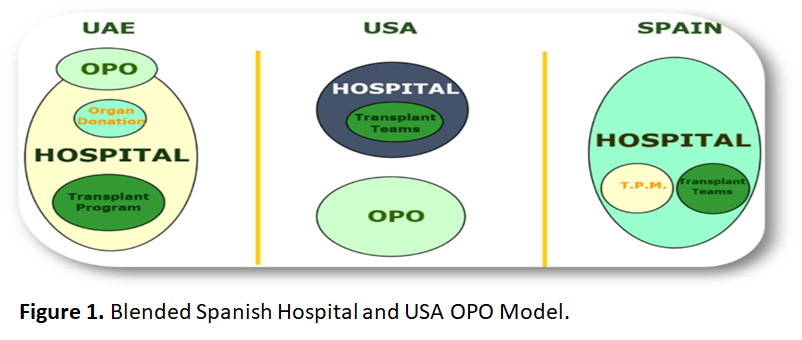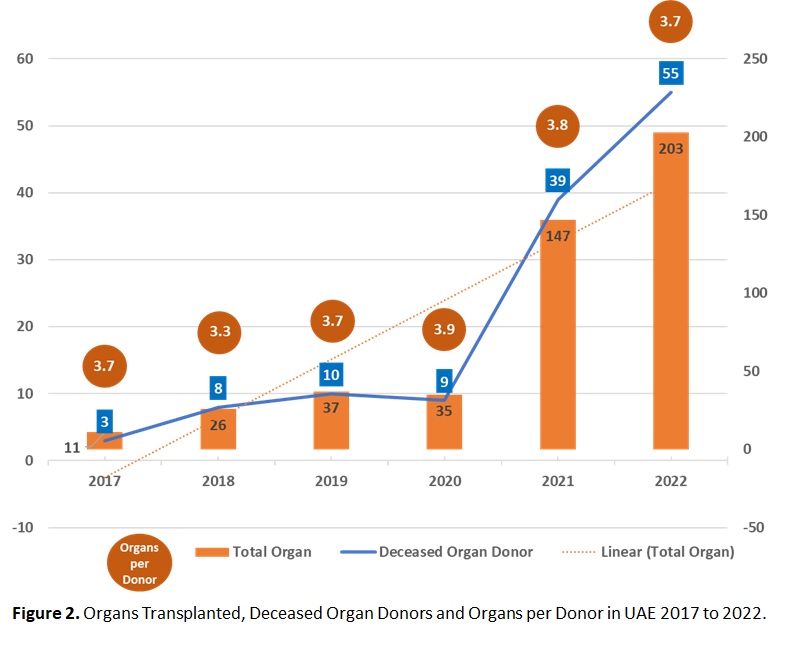UAE first 100 organ donors – extending lives in MENA Region
Ali Obaidli1, Marti Manyalich2, Reginaldo Boni2, Eduardo Sousa2, Zeljka Gavranovic2, Brian Alvarez2, Farida Younan2, Ayman Ibrahim1, Fatima Ibrahim1, Lina Haddadin1, MAURICIO Galvão Pereira2, Richard Pietroski2.
1Emirates Organ and Tissue Center, Abu Dhabi Health Services Co. , Abu Dhabi, United Arab Emirates; 2Donation and Transplantation Institute, DTI Foundation, Barcelona, Spain
Introduction: The United Arab Emirates (UAE) has been adopted since 2017 actions to increase the number of deceased brain death donors (DBD) and improve the transplantation.
Method: This study reviews outcomes achieved by the Emirates Organ and Tissue Center (EOTC) which follows all rules and has the same activities as an Organ Procurement Organization (OPO). The EOTC, in the last 5 years, has been dedicated improve patient access to transplants through a centralized effort to capture its first 100 DBD donors and, in addition, has been collaborating with transplant teams in UAE and the surrounding Middle East and North Africa Region (MENA Region). This approach was established following the UAE 2017 Ministry of Health and Prevention’s initial Criteria for the Diagnosis of [Brain] Death Ministerial Decision. Different actions were developed during this period: meetings with health stakeholders, training to ICU health professionals, visits to hospitals, and activities to professionalize organ donation. Moreover, UAE has been utilized a blended model applies the Spanish Transplant Procurement Management (TPM) hospital embedded critical care physician donor detection, donation consent, and medical management role, in collaboration with USA independent centralized OPO 24/7/365 representative support for organ allocation, histocompatibility/infectious disease testing, and donor/organ transport logistics (Figure 1).

Results: Since 2017, annual DBD totals ranged between 3 and 10 opt-in consented cases per year through 2020 for a 10 million population country. In 2021, 39 total DBDs were achieved, and 31 additional DBD cases were facilitated in the first 6-months of 2022. Sixty percentage of the first 100 DBD cases facilitated by the EOTC were achieved in 9-months at the end of 5-years following the national brain death decree. Total Deceased Organ Donors % Male was 74% and medium age was 39,28 + 14,76 (SD) years old. Overall, the period involving the first 100 DBDs yielded 365 organ transplants, 3.65 organ transplants per donor at 9 transplant centers located in 4 MENA Region countries and has impacted 36 distinct donor and transplant recipient nationalities. The most profound illustration of the UAE’s contribution of lifesaving transplants in MENA Region countries was a 428% growth in donors PMP from 2020 to 2021. This year-to-year improvement elevated the UAE 2020 country ranking of 60th with 0.91 deceased donor PMP, to a 2021 country ranking of 43rd with 3.9 deceased donor PMP and to 5.5 deceased donor PMP in 2022 (country ranking still not disposal) (Figure 2).

Conclusion: Key to the UAE’s recent contribution to extending lives through deceased organ donation and transplant were activities leading to a significant improved DBD rates involved a focus on hospital education in collaboration with a Blended Spanish Hospital and USA OPO Model to promote consistent detection, referrals and clinical assessment during all organ donation process.